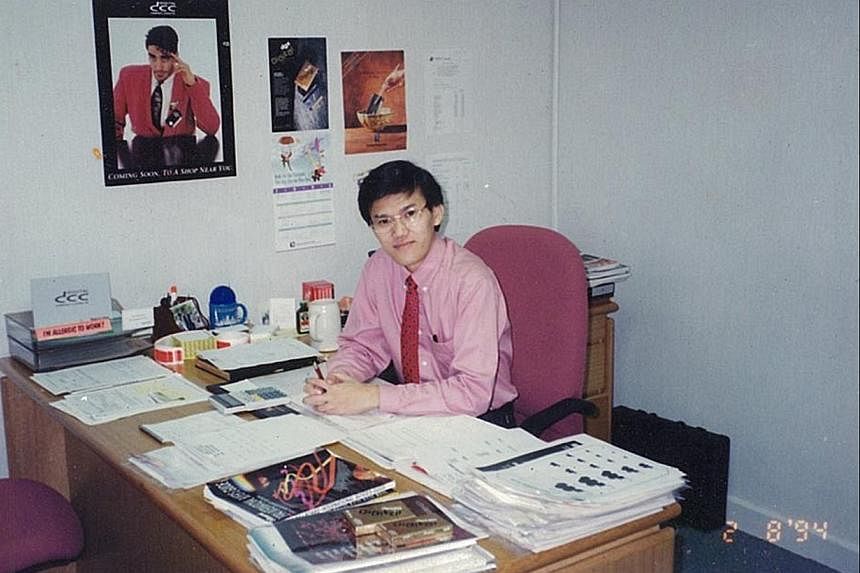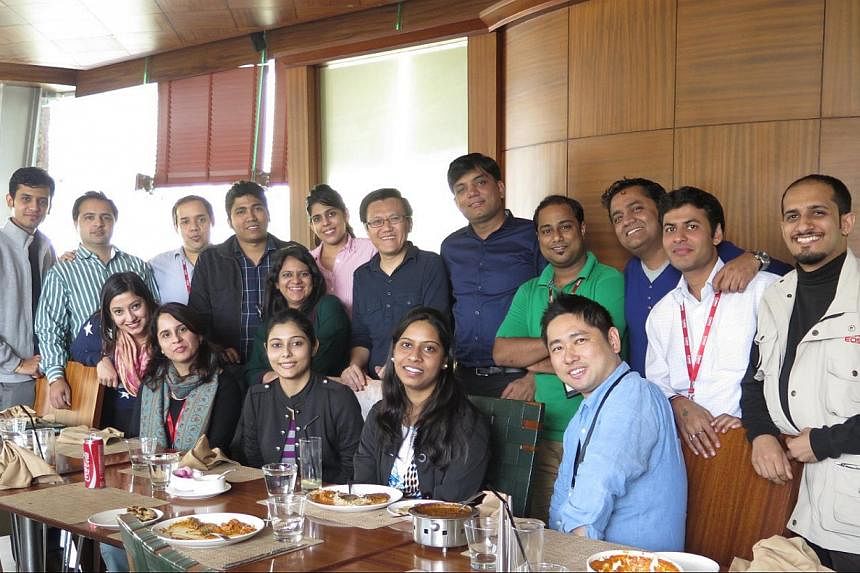Not long after his mother died when he was in Primary 5, Andrew Koh had to take a Chinese spelling test.
Emotionally traumatised by his loss and struggling with his studies, he cheated by referring to words he had copied down on a piece of paper hidden in his pencil box.
"My teacher saw what I did but didn't confront me. He let me finish the test, and then came over and whispered in my ear. 'Just don't do it the next time'," recalls Mr Koh, now 48.
"In fact, he still gave me 85 marks. I was stunned. After that, I never cheated again."
The episode, and several others, helped shape what has become a guiding principle in his life: "Never blame your circumstances. Life is 10 per cent of what happens to you and 90 per cent how you respond to it. I just work hard and make the best out of a bad situation."
He has. Despite a sad start in life, one marked by tragedy, deprivation and hardship, he rose above his trials to become an extremely driven and successful, but thankfully not hard or cynical, man.
The A-level holder cut his professional teeth as a sales representative in a local company. He beavered away to eventually become the general manager of consumer business for Japanese multinational corporation Canon in Singapore. Last August, Canon India appointed him to oversee the brand's camera business as senior director.
The diminutive corporate honcho grew up as the elder of two children in a kampung in Potong Pasir.
His father, he says, was an alcoholic and a wastrel.
"He ran his own small business, didn't do well, took to drinking and gambling and was always borrowing money. My paternal grandparents had to work and ran a small provision shop to support his habits," he says.
When he was seven, his grandfather died.
"My mother sewed and did whatever she could to help raise us. I remember she worked in a hawker centre near Kallang Gasworks and she would wake my sister and I early in the morning and take us to work with her," he says.
The hard labour took a toll on her health and she died of jaundice when he was in Primary 5 at St Andrew's Primary School.
"I had to go to Tan Tock Seng Hospital very often because she was in and out of hospital, but she would still work. She probably overworked herself," he says quietly.
Her death was a severe blow.
"She was the one who pushed us to study. I was just a Teochew boy who spoke no English but she queued for hours to get me into St Andrew's. It was a big deal because all our neighbours sent their children to neighbourhood schools.
"She changed my life. She showed me what it means to be hard-working. She never gave up, she had a never-say-die attitude and had so much confidence in us."
Life became even harder after her death.
"Only my grandmother was left. The provision shop business was not enough to sustain us, so she rented out parts of the house to operators running illegal gambling dens. They installed jackpot machines in parts of the house," he says.
The old woman also died three years later.
By then, Mr Koh had developed a deep hatred for his father.
"He didn't care. People would tell me, 'Your dad caused your mum to die and put you and your sister in this situation.' I just couldn't understand why he did what he did."
Fortunately, his mother's younger sister came into the picture. Although she had four children of her own, she took in the boy and his sister.
"We lived with my aunt and her family in their three-room flat in Upper Aljunied. She treated us like her own and never made us feel as though we were a burden," he says.
Still, his circumstances affected him.
"I remember having to go to a welfare office in Penang Road to collect our bursaries every month. It's not a good feeling when you're dependent on others. Some nasty boys in school also called me a parasite," he says.
There were, however, very kind friends too. He speaks gratefully of one classmate - now a well-known businessman - who asked his father to help out.
"On his own, he asked his father to give me $50 a month, with no strings attached. The father did that until I completed Secondary 4," he says.

Deciding he had to stand on his own feet, he sought the help of a Member of Parliament who successfully got the Housing Board to lease him a one-room rental flat in Joo Seng Road for $22 a month.
"My sister lived with me for a couple of years. I went to pre-university and survived by giving tuition and eating instant noodles almost every day. Luckily, my classmates and church friends also helped out," says Mr Koh, who lived in the flat until he got married when he was 29.
Although his A-level results were decent, he failed to get into the National University of Singapore.
Finding a job proved difficult after he completed his national service because he did not have a degree and had no work experience.
After nearly half a year, he was finally hired as a sales executive by a local company in Jurong which manufactured audio cassette tapes. The boss, he says, was impressed by his command of English.
"The job required a lot of writing and correspondence with customers in the United States and other parts of the world. The boss also came from difficult circumstances and probably saw himself in me," he says.
His starting pay was just $700 but the training he got on the job was invaluable.
He was sent to the US where the company had a representative office.
"The US Embassy initially refused to grant me a visa because I was a non-graduate, had no experience and was drawing only $700 a month. But my boss wrote a long letter saying that I had great potential."
His duties included marketing, taking care of orders and liaising with music giants such as Warner Bros and book companies such as HarperCollins.
"My boss gave me a lot of opportunities and trusted me. In the US, he taught me how to be confident when dealing with people, and how to make things happen because if you didn't do that, no one was going to make things happen for you. He made me make cold calls, listened in and taught me how to do it properly."
Around this time, his absent father got in touch with him.
"I hadn't seen or talked to him for many years then. But he was suffering from tuberculosis and was very sick. So I went to see him in hospital. When I saw how frail he was, I decided I had to forgive him and let all my grudges go. It was an important step for me because my resentment for him was eating away at me," says Mr Koh, whose father died two days after he left for the US.
Six years later, he moved to become the sales and marketing manager for another local company producing digital compact cassettes.
The job entailed extensive travelling, including to Syria and Lebanon.
"I had to be resourceful and find customers everywhere so that we could keep our plant going."
On one occasion, he had to fly into war-torn Beirut.
"There were only four or five passengers on the whole flight. Even the stewardess asked me why I was going there. I stayed at the Carlton and was the only guest there. There were bullet holes on the sides of the walls.
"I was not afraid. I guess that's because I was young and adventurous and not married," says Mr Koh, who married an insurance underwriter in 1995. The couple now have three children, aged between eight and 15.
His next professional stop was with Canon in 1997 where he started out doing marketing for its small microfilm division.
"I went on to scanners, inkjet and digital printers and then cameras," says the go-getter who in eight years was heading Canon's entire consumer business division, which has an annual revenue of several hundred million dollars.
"My background has probably made me a very driven person. Whatever I promise, I would deliver," he says.
Tasked with spearheading Canon's camera division in India last August, he lets out an embarrassed laugh when asked to describe his management style.
But when pressed, he says: "I expect a lot from people but at the same time, I make sure I lead by example. I will not ask my team to do things I myself cannot do. I believe no one can lead another further than he himself has gone. I must always lead from the front."
The congenial man has not forgotten his past.
Each Chinese New Year, his aunt gets a big hongbao from him.
He sponsors several underprivileged children from neighbouring countries and has helped a few needy students from his alma mater.
Smiling, he quotes a Chinese proverb: "When drinking water, you must always remember the source."



